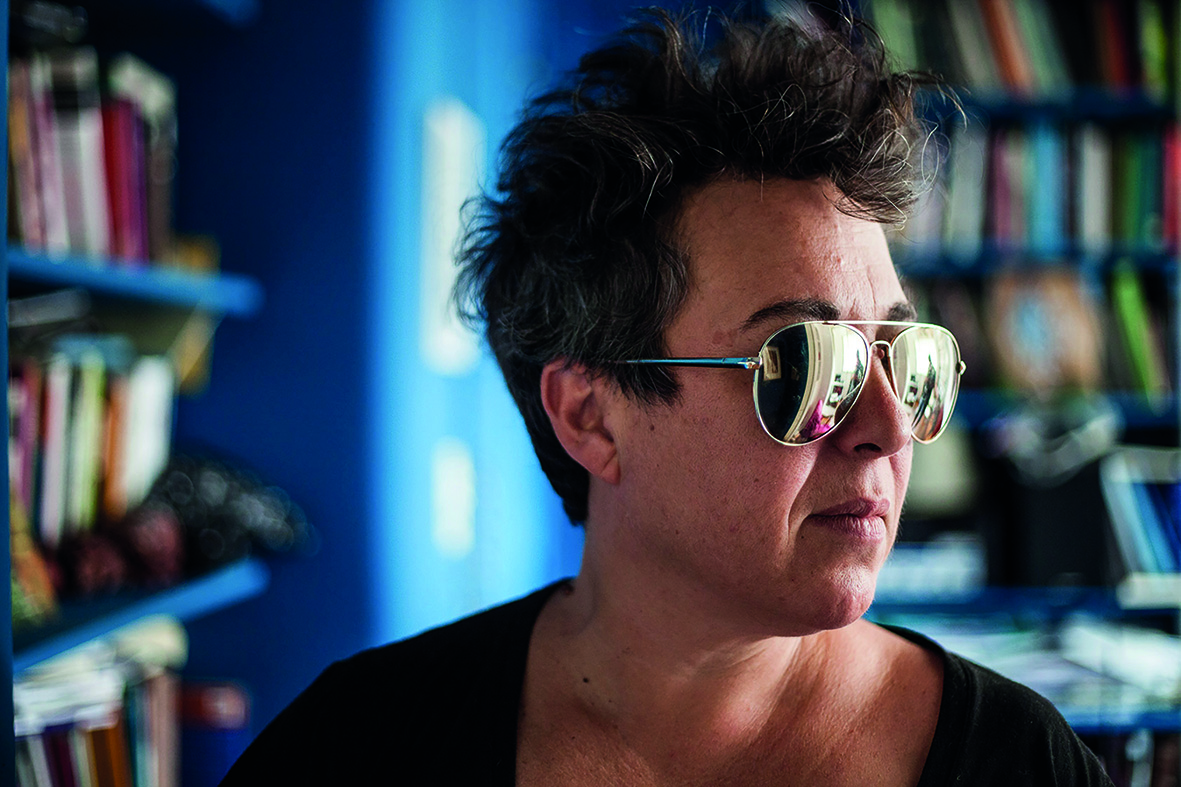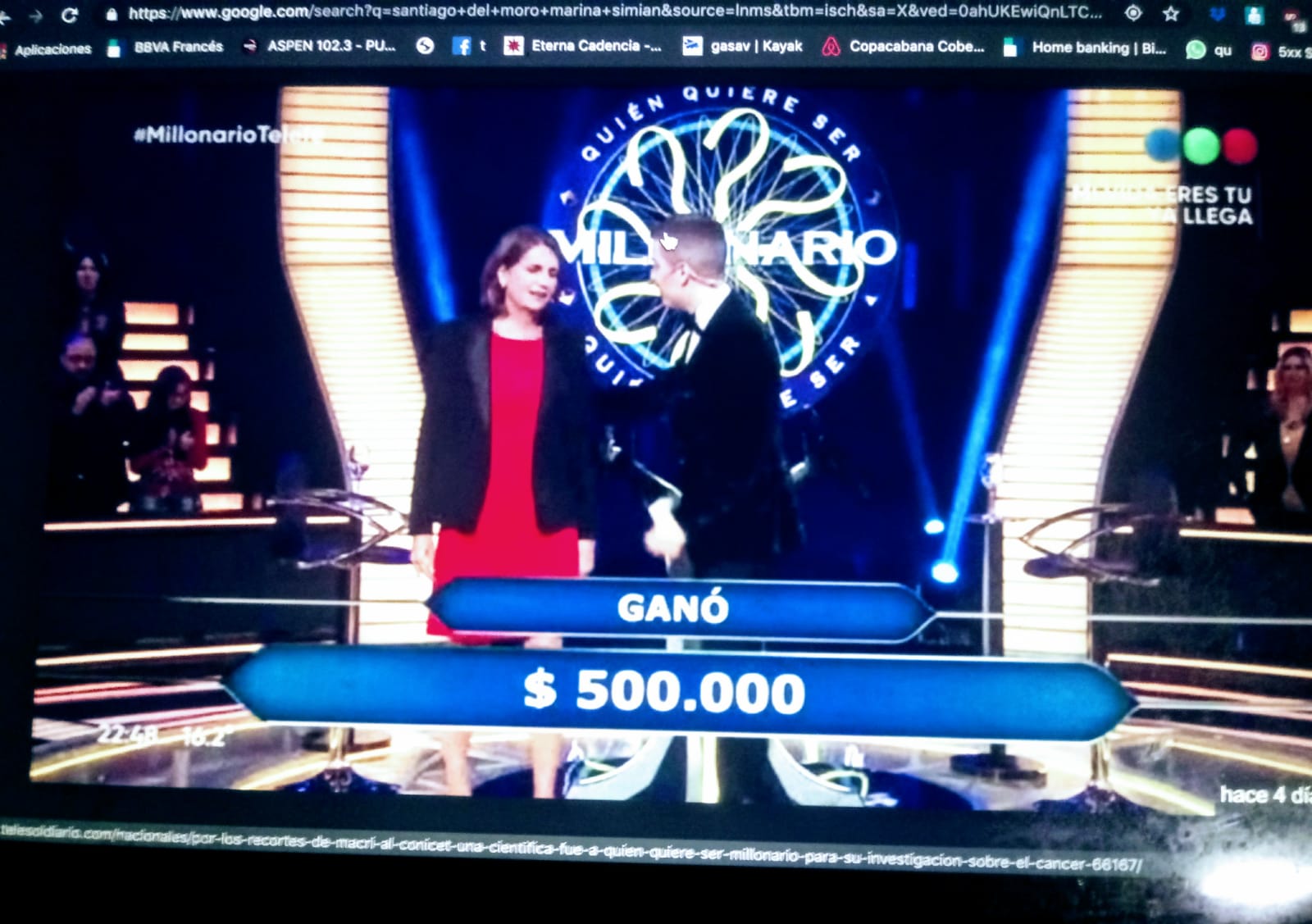Emoción
“Emoción”. Eso, con un tono intimista, como quien piensa en voz alta, dice una vez y otra el tipo disfrazado de muñeco de torta: con un smoking de tejido brillante y cabellera tan peinada que parece de plástico. Pero no, el conductor es muy humano; dice “emoción” y la muestra, se le caen, incluso, una o dos lágrimas; han de haber inventado alguna clase de maquillaje que no sufre la humedad. No sería sensato pedirle a la televisión una escena como la que Visconti le hace pasar al Gustav von Aschenbach en su Muerte en Venecia —la tintura del pelo se le derrite, con el sudor, al sol, y le cae como un llanto negro en la cara. “Emoción”, vuelve a decir el conductor televisivo en el decorado azul con luces de neón que preside en su programa de preguntas y respuestas. Se lo va a decir a la madre de familia que fue a competir porque sueña “con llenar la heladera” de comida para su hijo. Al pobre tipo que se quedó en la calle y quiere pagarse una temporada de techo. Se lo va a decir, también, a la mujer de la foto. Antes y después de que responda la pregunta decisiva: “¿Qué famoso certamen de belleza tuvo como primera ganadora a Miss Suecia, en 1951?”. Ella duda: ha estudiado mucho, es bióloga, doctora por la universidades de Buenos Aires y Berkeley. Investiga a “los macrófagos como blanco terapéutico en cáncer de mama y glioblastoma: estrategias terapéuticas basadas en la utilización de nanopartículas multifuncionales”: por qué algunos tumores de mama tienen recidivas. La bióloga acepta un “comodín”, un voluntario del público que se ofrece a responder. “Miss Mundo”, dice. El conductor hace silencio. Un silencio largo. Hasta que otorga: la respuesta es correcta. La bióloga del CONICET, el instituto de investigación ciéntifica del estado argentino, se alegra: ha ganado los 500 mil pesos, un poco menos de diez mil euros, que le permitirán a su equipo continuar investigando. El conductor lo dice: “emoción”. Y sí, dan ganas de llorar que la alimentación, el techo y las investigaciones ciéntificas deban dirimir su posibilidad de realización en un programa de televisión. Uno de mucha audiencia, claro.
Sensationell
„Sensationell“. In vertraulichem Ton, als würde er laut denken, geht dieses Wort eins ums andere Mal über die Lippen des Moderators, der wie eine Tortenfigur verkleidet ist: mit Smoking aus glänzendem Stoff, das Haar so gekämmt, daß es wirkt wie aus Plastik. Aber nein, der Moderator ist durchweg menschlich; „Sensationell“, sagt er, und wie er dabei empfindet, zeigen ein, zwei Tränchen; jemand muss eine ganz spezielle Schminke erfunden haben, die der Feuchtigkeit standhält. Es wäre unklug, im Fernsehen eine Szene zu liefern gleich der, die Visconti in seinem Tod in Venedig Gustav von Aschenbach erleben lässt – seine künstliche Haarfarbe zerfließt im Schweiß und rinnt ihm wie schwarze Tränen übers Gesicht. „Sensationell“, wiederholt der Fernsehmoderator in der blauen Deko-Umgebung mit Neonbeleuchtung, in dem er durch sein Frage- und Antwort-Programm führt. Er wird es zu der Mutter sagen, die beschlossen hat, bei der Show mitzumachen, weil sie von einem „vollen Kühlschrank“ träumt, mit Lebensmitteln für ihr Kind. Auch zu dem armen Kerl, der auf der Straße lebt und der sich eine Weile lang ein Dach über dem Kopf leisten können will. Und auch zu der Frau auf dem Foto, vor oder nach der Beantwortung der entscheidenden Frage: „Welcher berühmte Schönheitswettbewerb hatte 1951 Miss Schweden als erste Gewinnerin?“. Sie zögert: Sie hat lange Jahre studiert, ist Biologin, hat an den Universitäten von Buenos Aires und Berkeley promoviert. Sie forscht über „Makrophagen als therapeutischer Angriffspunkt bei Brustkrebs und Glioblastomen: therapeutische Strategien auf Grundlage der Verwendung von multifunktionalen Nanopartikeln“ zu der Frage, warum es bei manchen Brusttumoren zu Rezidiven kommen kann. Die Biologin nimmt einen „Joker“ in Anspruch, einen Freiwilligen aus dem Publikum, der bereit ist, die Frage zu beantworten. „Miss World“, sagt er. Der Moderator schweigt. Ein langes Schweigen. Verkündet dann: die Antwort ist richtig. Die Biologin des CONICET, Institut für wissenschaftliche Forschung des argentinischen Staates, freut sich: sie hat 500.000 Pesos gewonnen, knapp zehntausend Euro, die es ihr und ihrem Team möglich machen, ihre Forschungen fortzusetzen. Der Moderator sagt es: „Sensationell“. Und das ist es auch, und es kommen einem wirklich die Tränen, wenn die Versorgung mit Nahrung, Wohnung oder auch wissenschaftliche Forschung, dadurch ermöglicht werden, daß ein Fernsehprogramm sich ihrer annimmt. Eins mit hoher Einschaltquote, versteht sich.
Übersetzung: Lea Hübner
Emotion
‘Emotion.’ This is what, in a tone of intimacy, as if thinking out loud, the guy is saying over and over, the one dressed up like he just stepped off a wedding cake, with a shiny tuxedo and hair so smooth it looks like plastic. But no, the TV host is entirely human: he says ‘emotion’ and he shows it, and lets fall a tear or two; they must have invented a type of makeup that isn’t affected by the damp. It just wouldn’t be sensible to expect from the television a scene like the one Visconti puts Gustav von Aschenbach through in Death in Venice—his hair dye melts in the sun, with his sweat, and runs down his face like black tears. ‘Emotion’, the TV host says once again on the neon-lit blue set he presides over on his question and answer programme. He’s going to say it to the housewife who came on because she dreams of ‘filling the freezer’ for her son. To the poor guy who ended up on the street and just wants to pay for a roof over his head. He’s going to say it to the woman in the picture, too. He’ll say it before and after she responds to the decisive question: ‘What famous beauty contest was first won by Miss Sweden in 1951?’ She hesitates: she’s studied a great deal, she’s a biologist, with a doctorate from the universities of Buenos Aires and Berkeley. She’s researching Macrophages as a therapeutic target in breast cancer and glioblastoma: therapeutic strategies based on the use of multifunctional nanoparticles: or why some breast tumours come back. The biologist accepts a ‘lifeline’, and a volunteer from the audience offers to answer. ‘Miss World’, he says. The host calls for silence. A long silence. Until he declares: it’s the right answer! The biologist from CONICET, the Argentine state scientific research institute, is delighted: she’s won 500,000 pesos, a little under 10,000 euros, which will allow her team to carry on their research. The host says it again: ‘emotion’. And, yes, it does make you want to weep that the possibility of food, shelter and scientific research should depend on a television programme. One with great ratings, it is true.
Translation: Fionn Petch
Share
-
14 Dienstag
19:30 UhrHausgäste Mai 2019
Galal Alahmadi, Gabriela Cabezón Cámara und Jan Němec
in Lesung und Gespräch
Veranstaltungen mit Gabriela Cabezón Cámara
2019
Mai











